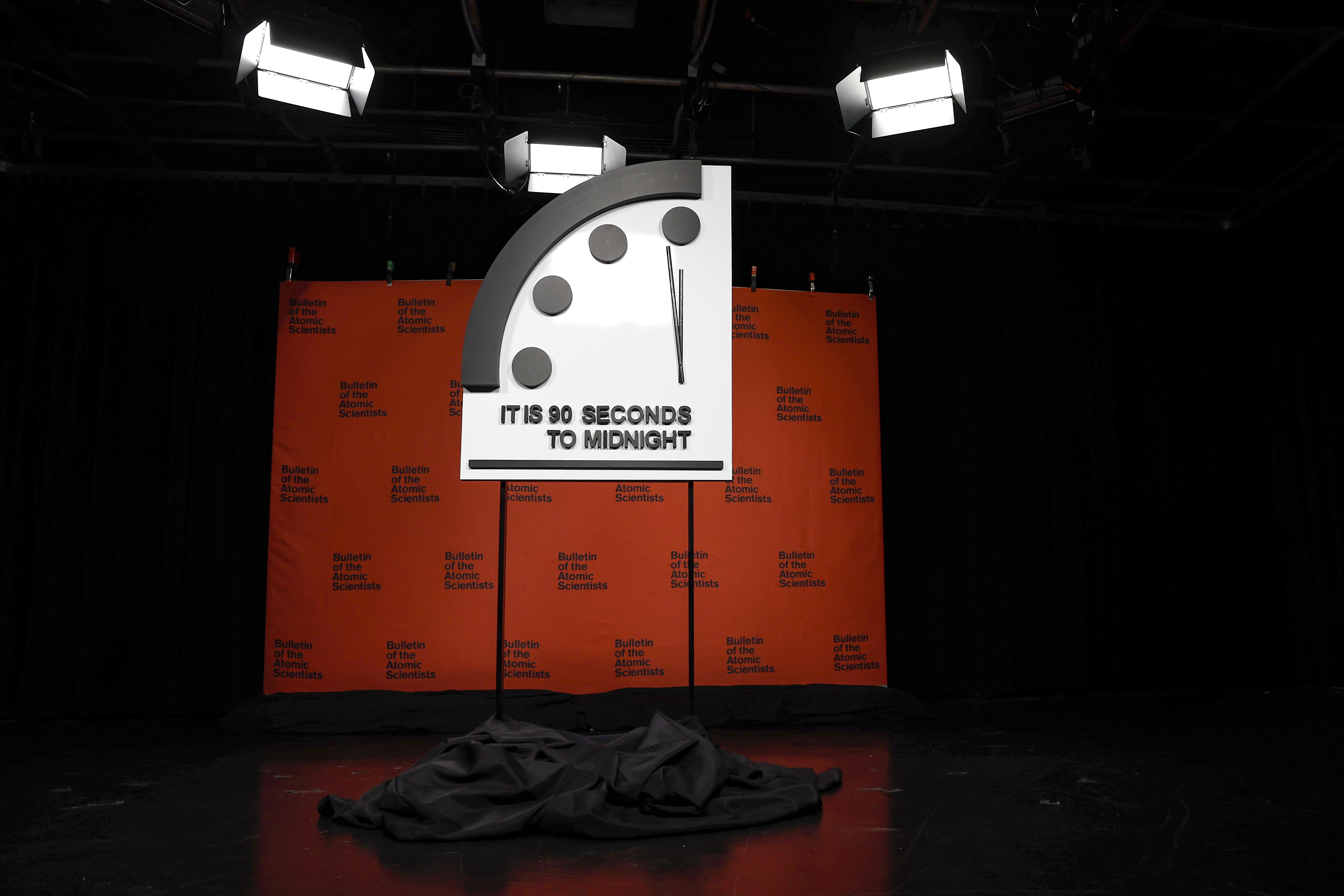All about the Doomsday Clock
Midnight is getting closer


A free daily email with the biggest news stories of the day – and the best features from TheWeek.com
You are now subscribed
Your newsletter sign-up was successful
Scientists have updated the "Doomsday Clock," putting humanity officially at 90 seconds to midnight. What is the Doomsday Clock and what is its significance? Here's everything you need to know:
What is the Doomsday Clock?
The Doomsday Clock is a symbolic design created in 1947 by the Bulletin of Atomic Scientists to warn humanity "about how close we are to destroying our world with dangerous technologies of our own making." The clock takes into account the threat of nuclear war, climate change, and global health, per The Washington Post.
The original clock focused specifically on the potential for nuclear war, since 1947 was the first year of the Cold War between the U.S. and the Soviet Union. Now the clock is the closest its ever been to "midnight" of humanity's destruction at only 90 seconds away.
The Week
Escape your echo chamber. Get the facts behind the news, plus analysis from multiple perspectives.

Sign up for The Week's Free Newsletters
From our morning news briefing to a weekly Good News Newsletter, get the best of The Week delivered directly to your inbox.
From our morning news briefing to a weekly Good News Newsletter, get the best of The Week delivered directly to your inbox.
Whether the clock is moved and by how much is determined by Bulletin's Science and Security Board, which is made up of a number of scientific experts across disciplines. They may also consult the Board of Sponsors, which includes a number of Nobel Laureates.
Why did the clock move forward?
The clock had been at 100 seconds to midnight since 2020. It has now moved forward by 10 seconds, to 90 seconds to midnight. The largest contributing factor was Russia's war on Ukraine. In the statement announcing the clock's movement, the Science and Security Board explained that "Russia's thinly veiled threats to use nuclear weapons remind the world that escalation of the conflict — by accident, intention, or miscalculation — is a terrible risk."
Along with the threat of nuclear war, the board also cited how Russia's actions have stunted the world's efforts to combat climate change. "Countries dependent on Russian oil and gas have sought to diversify their supplies and suppliers, leading to expanded investment in natural gas exactly when such investment should have been shrinking."
Other considered issues included China and North Korea expanding their military and nuclear capabilities, record-high CO2 emissions, the level of infectious disease outbreaks, cyber-disinformation, and the string of extreme weather events, as mentioned in the Bulletin's press release.
A free daily email with the biggest news stories of the day – and the best features from TheWeek.com
"What we're conveying with the clock move is, things are not going in the right direction, and they haven't been going in the right direction," said Rachel Bronson, CEO of the Bulletin of the Atomic Scientists.
Will the clock reach midnight?
If it does, humanity won't be around to see it. "When the clock is at midnight, that means there's been some sort of nuclear exchange or catastrophic climate change that's wiped out humanity," Bronson remarked. "We never really want to get there and we won't know it when we do." She also believes it is possible to turn back the clock, but doing so would take "serious work and global engagement at all levels of society."
The Science and Security Board emphasized that peace negotiations would lower the risk of catastrophe, saying: "In this time of unprecedented global danger, concerted action is required, and every second counts."
Devika Rao has worked as a staff writer at The Week since 2022, covering science, the environment, climate and business. She previously worked as a policy associate for a nonprofit organization advocating for environmental action from a business perspective.
-
 What to know before filing your own taxes for the first time
What to know before filing your own taxes for the first timethe explainer Tackle this financial milestone with confidence
-
 The biggest box office flops of the 21st century
The biggest box office flops of the 21st centuryin depth Unnecessary remakes and turgid, expensive CGI-fests highlight this list of these most notorious box-office losers
-
 The 10 most infamous abductions in modern history
The 10 most infamous abductions in modern historyin depth The taking of Savannah Guthrie’s mother, Nancy, is the latest in a long string of high-profile kidnappings
-
 How climate change is affecting Christmas
How climate change is affecting ChristmasThe Explainer There may be a slim chance of future white Christmases
-
 5 recent breakthroughs in biology
5 recent breakthroughs in biologyIn depth From ancient bacteria, to modern cures, to future research
-
 Why scientists are attempting nuclear fusion
Why scientists are attempting nuclear fusionThe Explainer Harnessing the reaction that powers the stars could offer a potentially unlimited source of carbon-free energy, and the race is hotting up
-
 Canyons under the Antarctic have deep impacts
Canyons under the Antarctic have deep impactsUnder the radar Submarine canyons could be affecting the climate more than previously thought
-
 NASA is moving away from tracking climate change
NASA is moving away from tracking climate changeThe Explainer Climate missions could be going dark
-
 What would happen to Earth if humans went extinct?
What would happen to Earth if humans went extinct?The Explainer Human extinction could potentially give rise to new species and climates
-
 Bacteria can turn plastic waste into a painkiller
Bacteria can turn plastic waste into a painkillerUnder the radar The process could be a solution to plastic pollution
-
 Scientists want to regrow human limbs. Salamanders could lead the way.
Scientists want to regrow human limbs. Salamanders could lead the way.Under the radar Humans may already have the genetic mechanism necessary
